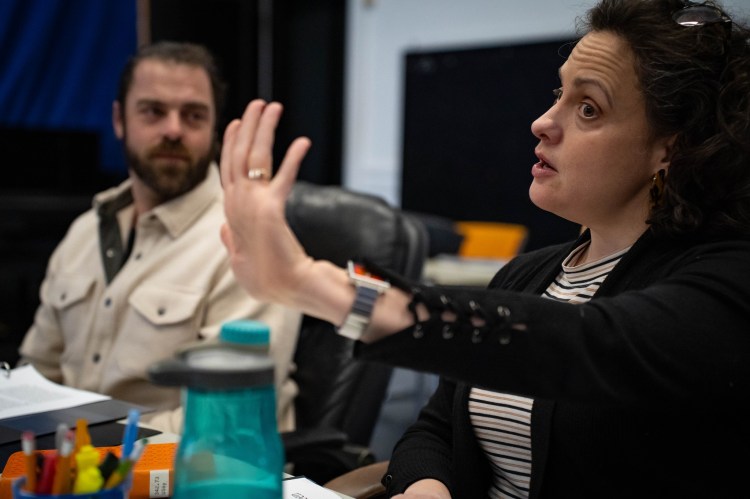Set in an American Legion Hall and ending with a live debate featuring local high schoolers, What the Constitution Means to Me is hard to classify. “It’s a Broadway hit and Pulitzer finalist, a one woman show with two other people. It’s a memory play with audience participation,” said Todd Brain Backus, who is directing the production at Portland Stage. “It’s all these things at once, and that makes it very fun.”
The play was written and originally performed by Heidi Schreck, based on her teenage years as a competitive constitutional debater. Abigail Killeen* will play “Heidi” with Matthew Delamater as “The Legionnaire” and they both joined Backus for a conversation a week before opening.
*Member, Actors’ Equity Association
I have wanted to see this show since I heard of it. It sounds so entertaining, but I’m a nerd, so I’m also thinking, “what a dynamic educational experience!”
MATT DELAMATER: [Laughing] It is! It really is fun and funny, but I have learned so much about the Constitution, which kind of made me sad about how little I did know. And man, it is an onion. Now I see the amendments everywhere, which is kind of terrifying to some degree but hopefully inspiring and liberating.
ABIGAIL KILLEEN: When I describe it to friends, I say, it’s about Roe v. Wade and violence against women… but it’s a comedy! I had such a visceral experience when I first watched it. Heidi uses these beautiful words to describe the first clause of the 14th Amendment, which says that everyone born on U.S. soil is a U.S. citizen, and that’s true, except for Native Americans. And I’m like, “Aghh! I didn’t know that!” I have the luxury as a white person to have not learned that part. So, yes, it is an incredible, beautiful amendment, but we’re taught particulars about the Constitution in school, and those things are true, but there are other parts, absent parts, that are true.
What is it like playing Heidi, embodying a living person with the words they wrote?
KILLEEN: There’s this mysterious paradox in the art of acting, that by playing another person, we are somehow more ourselves. In acting, I am allowed to access parts of myself that I don’t in everyday life. What that means for the audience, well, when I was a young student, I heard actor Michael Moriarty say, “acting is the word made flesh,” which I learned later is derived from Christian scriptures. But this play tells a story about the people who make the decisions and the people affected by the decisions. As actors, we bring dimensionality, flesh, and real stakes to the ideas. Since the show debuted in 2018, there have been significant changes to some of the topics it addresses. How do you update the show?
BACKUS: In the script, the debate is set in the now, so we have to modify. It provides facts and figure for us to update, options of metaphors to reflect on and play with, and questions to reflect on to help you navigate. I mean, one of the parts of the debate is asking, “Is it possible the Supreme Court could overturn Roe v. Wade?” and well, they sure did.
Tell me more about the audience’s role in the show. That must be exciting to anticipate as you get closer to opening.
BACKUS: The play builds to Heidi debating with high schoolers, about whether we should keep or abolish our constitution. Then we pick a random audience member to choose the winner for the whole audience. I’m really excited to see what Portland feels about the ideas raised in the play.
DELAMATER: What I love about my role is how much I get to observe. Abby and I aren’t doing traditional scene work in rehearsal, and what she’s doing is almost like stand-up comedy, really connecting with the human beings in the audience. It’s fascinating. There’s no fourth wall on this one.
 Copy the Story Link
Copy the Story Link
Comments are not available on this story.
Send questions/comments to the editors.


